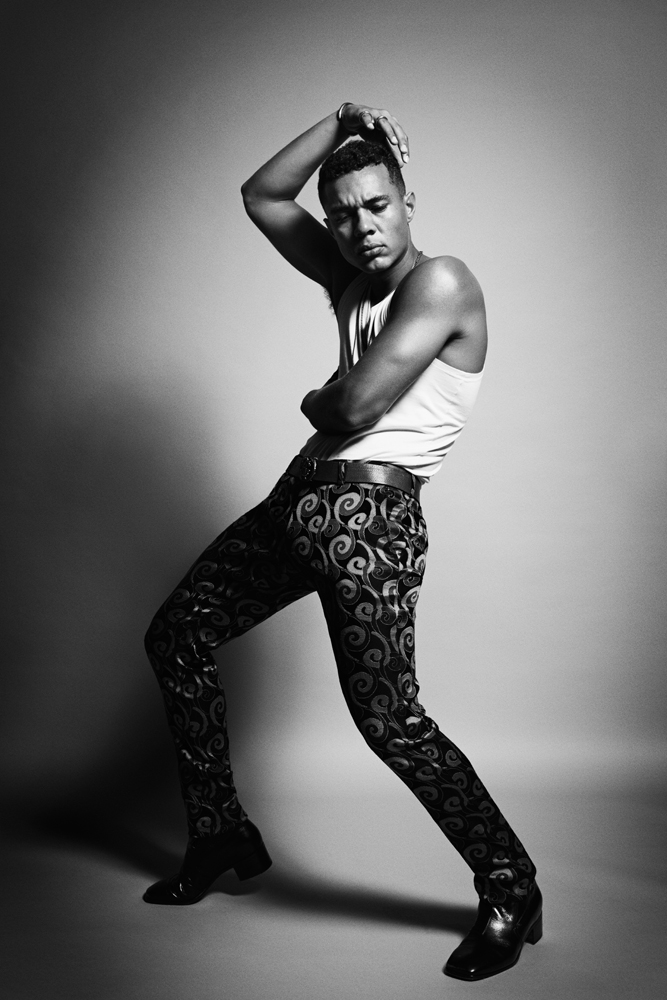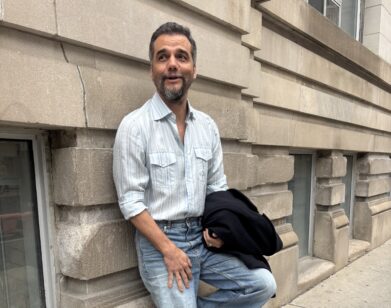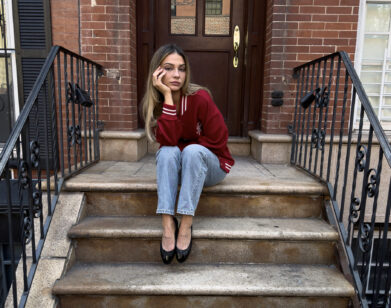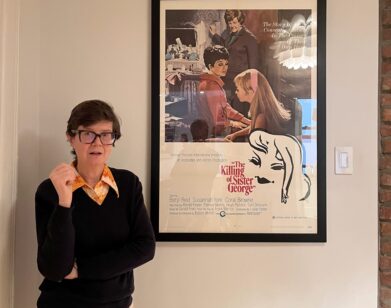Discovery: Ismael Cruz Cordova
PHOTOS: DAVID NEEDLEMAN/JONES MANAGEMENT. STYLING: JULIAN ANTETOMASO. GROOMING: LAURA DE LEON/JOE MANAGEMENT USING CHANEL. RETOUCHING: FEATHER CREATIVE.
When Ismael Cruz Cordova was cast in Showtime’s new comedy pilot SMILF, a fan expressed concern: “It’s hard to picture you in a comedy after Ray Donovan,” they tweeted at the actor. Cordova, however, is not worried: “Whoever knows me is not surprised,” he explains over the phone. “In real life, I’m much more lighthearted and always cracking a joke, always finding the funny in things.”
The comment is a compliment, really; a testament to the extent Cordova sold his performance as tortured boxer Hector Campos on Donovan. On paper, Campos’s storyline sounds melodramatic—a survivor of sexual abuse at the hands of his childhood priest, Hector is involved in a toxic love affair with his junkie half-sister played by Lisa Bonet—but Cordova’s pathos made the character believable. “I think that the role of an actor is to find truth in all of these things,” he says. “Nobody protected Hector as a child. All of these figures of respect and trust and holiness used him. All this little kid wanted was love; he trusted that that was real … That’s what I have to connect with, because the rest is too dark.”
Before joining Ray Donovan, Cordova, who was born and raised in Puerto Rico, studied experimental theater at NYU. His first professional gig in the U.S. was a guest spot on The Good Wife (it was supposed to be one day of work, and ended up as five episodes.) Following a long audition process, he was cast on Sesame Street. “Everybody is very emotionally attached to that show because it’s so cool,” he tells us. “But I wasn’t aware that it was such a big thing.” Then just as he was questioning his career choice, came a string of breaks: Ang Lee cast him in his new film Billy Lynn’s Long Halftime Walk, the story of a group of American soldiers on leave for a victory tour shot at a record speed of 120 frames per second; he joined the fourth season of Donovan; filmed Citizen, a pilot co-written by director Alfonso Gomez-Rejon, whom Cordova calls “a genius;” and, of course, was brought back to the Showtime family for SMILF.
In his free time, Cordova is a musician and visual artist. When he arrived at our photo shoot in New York, his entourage was his family: his father, mother, two of his three sisters, and his young nephew.
WHERE I GREW UP: It was very rural. At the same time, that kind of island life, you have this mixture of rural and inner city. They have also projects in that rural area. It was a workers’ town, very poor, high levels of illiteracy. But it’s a beautiful, beautiful place. Acting wasn’t really on the spectrum of possibilities. It was a hobby, or even less than a hobby. To be able to progress in life or succeed, the goal was to become one of those quintessential careers: doctor, lawyer, engineer—something like that. That’s what I had set my mind to do. I wanted a better life and I wanted a better life for my family. I was especially interested in becoming a pediatrician. I always had a lot of artistic inclinations—I always wrote, I always sketched—but I decided that I was going to be a doctor.
FROM SWIM TEAM TO DRAMA CLUB: I was a swimmer, a national champion in certain events. I thought that would be my ticket to a college. In that, I was given a scholarship to a private school. There, I saw for the first time a club fair. They had a drama club table and for some reason I just signed up. I went to that first meeting and that’s when I decided that I was going to do it. For the rest of my life. [laughs]
EARLY ACTING EXPERIENCES: Once I started doing drama, I wanted more and more and more. I started auditioning in secrecy in the city. I would sneak out of school and go audition. I auditioned for this one movie and I didn’t get it, but [the casting agents] saw me at the mall later on. They said, “We have this other audition, you should come over.” It was this movie called Bala Perdida, or Stray Bullet. It was a local film, the real story of this young girl that was hit by a stray bullet on the eve of New Year’s Eve. That’s actually a very big problem in Puerto Rico—people just shoot up in celebration and then those bullets kill people like a mile down the street. I think I was 14 or 15 when I was cast.
MOVING TO NEW YORK: I had never gone to New York before, but initially I did not have culture shock at all. By the time I was able to come to New York, I’d wanted to be there for so long that I just couldn’t be happier. I had applied for 13 schools [in the U.S.] the year before. They asked me to go audition, but I couldn’t, because I honestly just couldn’t afford traveling to the auditions. A month after all my applications were canceled or rejected, I got this award, and they gave me a round-trip ticket [to New York] and a thousand dollars. So I started college in Puerto Rico with the hopes of using that same thing the year after to go and audition as a transfer student. I only applied for NYU that time and I went and auditioned and I got in. When I arrived, I felt like the city was waiting for me; I had landed where I needed to be. But I say initially—initially, it was a delight. I was so happy. The more I stayed in New York, the bigger the culture shock became.
FINDING HECTOR CAMPOS: I learned in that first episode that Hector’s a survivor. He comes from a very tumultuous family and he has this relationship with his half-sister. I knew all those things, however I didn’t know how it was going to develop—all the intensity. I went in falling in love with that character, having so much compassion for him. And I was kind of terrified—it was the most layered character I’d ever encountered. It’s a lot. Being cast in this role offered so many different opportunities for us to tell the story of these survivors of sexual abuse.
WORKING OPPOSITE LISA BONET: We don’t often come across these opportunities to just play the hell out of a character that has all the complexities of a human. I think when [Lisa and I] met, we both felt that way. We were so committed to honor these people, to honor the story of these people. We were completely in tune with that; it was immediate. We just said, “Let’s have a coffee and talk.” We treasured and loved our characters so much that it was very organic. And Lisa is a true artist and a collaborator; it was never about ego or us wanting to shine, it was bringing these people to the screen. I think that’s how people reacted, they know the honesty that we brought to that and the love that we had for them.
GETTING CAST AS BILLY LYNN’S SERGEANT HOLLIDAY: The audition process was actually one of the most brief that I’ve had. You would expect a year of auditions, but I auditioned in New York and then in L.A. They asked me to do a self-tape for Ang [Lee] and that was it. I auditioned for one character, got called back for another, and then when I got to set, I found out that I had been cast as this third character [Sergeant Holliday]. People kept calling me “Sergeant” when I got on set. I was like “What are they talking about? I’m this other character.” And then Ang called me into his office and said, “I saw your tape and when I saw you it made me want to bring back this character from the book.” Sergeant Holliday wasn’t in the original script, so they brought him back from the book.
A SOLDIER’S LIFE: We did a bootcamp for five weeks. It was incredibly grueling and involved, and one of the most difficult things that I’d done to date—I then went into training for Ray Donavan, which was very intense. But we’ve lived the life of these characters, of the soldiers, completely immersed. They pulled rank immediately. We only called each other by our character names. As a sergeant, I had a lot of responsibility and was in charge of the guys for most of the bootcamp. Garrett [Hedlund] joined us later and he was my higher-up, but while he was away I was the sergeant for the bootcamp. It was an incredible amount of responsibility, because I was accountable for everything; I was the example of the regulations. My uniform needed to be perfect. I was the only one who had a watch as well, so if they were late, it was my fault. [laughs]. I would do their punishments—I had to do pushups with everybody. If somebody made a mistake, that person was held accountable and I was held accountable as the leader as well. It was very serious. Ang was very interested in us living as these characters onscreen, and with the technology, it’s so sharp and so clear that if you’re performing in any way, it shows. The interest was for us to live, breathe, and even sit and exist in stillness as our characters. So the process was designed in that way and I think it really achieved that. I broke every barrier and every expectation that I had of myself—of my mental and emotional and physical strength—like tenfold. In that process, I learned so much about self-reliance, brotherhood, and accountability.
UNDER THE DIRECTION OF ANG LEE: Everything that you would do in bootcamp started impacting your role in the movie. You would notice that they would write more stuff in based on your performance, and consistently ask for your input: “What do you think about this?” Then, when we started shooting, I noticed that Ang’s a man of very few words. I got a bit unnerved by that at some point: “Why don’t he say anything? Why doesn’t he tell me anything?” One night we were doing this cast dinner and I asked him. I said, “Dude,”—and that was the first thing in my head, “Don’t call him dude! I just called him dude”—”why don’t you say anything?” He said, “I cast you for a reason. It’s a trust that I have in your talent, in your work, and that magic that you bring is what I want. I will let you and my actors fly in that way. As long as you’re in this world, the world of the movie, I’ll let you do your thing because I trust you.” That was really a moment of growth for me. It really set up for this next stage in my career, and really owning myself.
THE COST OF AN ACTING CAREER: I had so many moments where I just didn’t know anymore. I think that happens in any profession, you’re like, “What am I doing? Where am I headed? Is it worth it?” This amount of sacrifice, leaving my country, leaving my family, going from couch to couch, I had no place to really to develop myself, my life, to develop a relationship. I kept looking back at where I came from and that really fueled me through the feelings of despair and hopelessness. I would see these small successes, and then I wouldn’t work for a year again. When I really felt that I was going to quit was, coincidentally, a week before I got my film with Ang Lee. That was the first time that I really admitted to myself that perhaps I had to move on and go back to school and study something else. I was in my car and all my savings were gone. I had gone to L.A. to try to do pilot season. I remember I called my mom, kind of embarrassed because you want to make your parents proud. I just started crying, I said, ” I don’t know what I’m doing.” My mother did what she does a lot, which is just listen. She asked me if I was sure. My parents weren’t supportive of me in the beginning when I started acting. This really shattered their dreams for me, because neither of them was able to pursue a college education. My mom didn’t even finish high school. So it was very hard for them, for me to pursue this career. But through me working and them seeing my passion and what it was about for me, they jumped on my boat—slowly, but they did. So when I called my mom, surprisingly she wasn’t like, “Oh, awesome! Go to grad school and change your path!” like she was hoping for this moment. It was more like “Are you sure? Look at all your sacrifices so far. Are you sure?” She kept asking me that question and I wasn’t sure, clearly. But I was sure that I’d already invested so much and that this was the best way for me to create the impact that I wanted to create—including the writing and producing and directing. Also, I think I’ve passed the point of no return. There’s no way I’m going back to school now.
MY NEPHEW: Is my favorite person in the whole world. That boy has given me so much purpose. I do so much that I do for him, because he is the new generation of our family. We want to give him the opportunity that we didn’t have. I would hope that he feels inspired by the things that I do, to know that he can just go ahead and be and live and create, whatever he wants. He’s a very inspiring kid himself.
BILLY LYNN’S LONG HALFTIME WALK IS OUT NOW.







